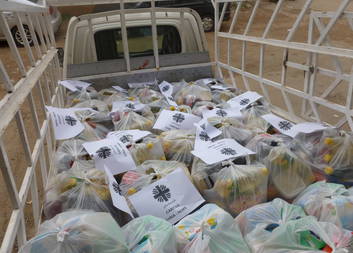There are now approximately 650 000 Syrian refugees in Jordan. Jordanians share their homes, schools, hospitals, job opportunities, even their depleted water stores with them. The refugee presence has a significant negative effect on the national economy with the capacity for providing humanitarian aid in Jordan having been fully saturated.
Jordan needs five million dollars for years 2014 to 2016, according to a national plan aiming to deal with the effects of their refugee influx.
The Jordanian educational system has been affected by an enormous increase in the number of students. The arrival of 140 000 new Syrian students has caused overcrowding in schools and the Ministry of Education was forced to operate schools in two shifts.
In the area of health service, the number of Syrian refugees who need health care grew by 250%. The number of operations in general hospitals grew by 600% since the beginning of the crisis.
At the beginning of December 2014, Jordan started a ''Regional plan for the year 2015'' created by the Jordanian government in a cooperation with national and international partners, in order to reduce the impact of the Syrian crisis on the country. The goal of this programme was to harmonise the needs of the refugees and the local inhabitants, in line with national priorities. The programme was based on the combination of humanitarian and development programmes. Jordan will need 2.87 million dollars for the year 2015 in order to cover the expenses caused by the influx of thousands of Syrian refugees. The plan addresses education and development, the power industry, the environment, health services, standard of living, justice, water resources, transport and social protection. It also takes funds to help the state budget cover losses incurred as a result of the Syrian crisis, particularly the losses of spending on security and goods subsidized by the government.
World Food Programme, WFP
The WFP has faced continuing cutbacks in the last three months of the year 2014, which led to the reduced value of food stamps being provided; going from 24 to 12 dinars per person. A regular monthly assistance for approximately 540 000 refugees living in towns and villages has also been suspended. According to the agency, distribution of aid in refugee camps will continue.
The suspension of aid has affected more than 1.7 million refugees settled in states neighbouring with Syria (including Jordan). This measure poses a threat to the health and safety of refugees and, according to executive director of WFP, may lead to further tension, instability and insecurity in Jordan and other countries. It is expected that it will lead to decreased school attendance by children from affected families (as it will now be more necessary for them to find a job supporting their family’s income), and to the increase of begging and the number of early marriages.
In the 2015, the programme will assess the new system based on the principle of providing food for their work. The goal is to support a wide array of refugees and to help them return to normal life. This change comes during a tough period of financial cuts and parallel with the global initiative. Through the agency of the initiative, the programme will attempt to collect 1.5 million dollars in food aid for about seven million Syrians displaced within Syria or settled in neighbouring countries.
Health Care
According to the speech of Jordanian authorities, the government had no other option except to stop providing free medical care for Syrian refugees after the costs of providing this service increased enormously. Previously,
the Ministry of Health provided free medical care for refugees and guaranteed them the same rights as the Jordanians in terms of having health insurance. However, the burden of the entire system increased unbearably because of the absence of additional incomes.
The Ministry has singled out 5 000 medics to reduce the pressure on Jordanian health service caused by a number of Syrian patients. The government also decided to stop providing free treatment for Syrians; instead they will pay a nominal fee – the same as Jordanians without a health insurance. However, free treatment will continue to be provided to refugees diagnosed with a transmissible disease (for example tuberculosis and hepatitis). Polio vaccination and health educational courses supported by UNICEF, WHO and UNHCR will remain free.







